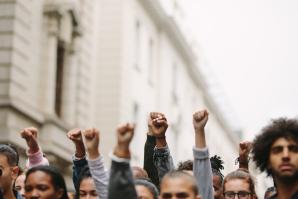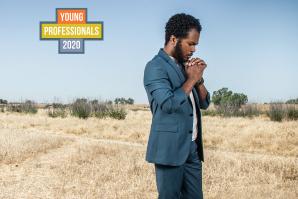Fierce anger and dismay to the point of tears is how I felt as I watched the video of the murder of George Floyd. But I also felt numb because I knew within a few days, it would happen again, and then a few days later, again and again, ad infinitum. I know this because it has happened so many times already.
I’m a business advocate, capitalist, husband and father — certainly not a radical in any way. But I’m also Black, and that’s enough to have negative interactions with law enforcement. For any of you who know me, you might be surprised to hear these things. Make no mistake, though: Since childhood, I have been threatened, accused of being in the “wrong neighborhood,” detained for driving “suspiciously” and told that “we are looking for a Black man” who committed a crime, so “we pulled you over because you fit that description.”
I’ve been targeted by officers more than a dozen times simply because of my race. On more than one occasion, I thought it might result in the end of my life. One time, I yelled out in terror at the top of my lungs, “I’m here to see your mayor!” when a cop grabbed his gun and pointed it at me because he thought my cellphone was a gun. A few hours later, I was on television doing an interview for a high-profile public campaign for a major development. That’s the dichotomy of my life. I share this because everyone has to believe the problem is real in order to be part of the solution.
That officer’s fear and my anger won’t solve these issues. The result of those two feelings has played out before our eyes with protests, looting, beatings, more videos of police brutality and more of us pulling apart from each other. In Sacramento, one can see how the collision of these feelings affected businesses, many of whom have somehow survived a global pandemic only to be crushed by a racial pandemic. The anger of the Black community is completely justified: Every single peaceful effort has failed. But if you want to help solve this problem, instead of fear, hate and anger, the response needs to be love, compassion and, yes, even forgiveness.
We have a problem with structural racism in this country, and it’s not just an issue with law enforcement. It is embedded in all of our institutions: government, health care, education, business, etc. White privilege is not an accusation against white people, and it doesn’t mean that a white person’s life and success in business haven’t involved overcoming major obstacles, it just means the color of their skin hasn’t been one of those obstacles. Living in a structure of systemic racism, or even benefiting from it, does not make someone a racist, but people must be willing to actively tear down those racist underpinnings and see the problems exposed, even in your own company.
Those protesting and carrying signs saying “Black Lives Matter” or “I Can’t Breathe” are not your enemies, and even if you do not support their methods, you can at least support their message. At a minimum, advocate for police reform and pressure elected officials to renegotiate their police union contracts to take away protections for bad officers and give higher rewards for the good ones. If the videos of police brutality don’t break your heart and give you love and compassion for your fellow human beings, then there’s nothing more to read, but if you’re a business owner or leader in the community who wants to help make real change, here are three practical steps you can take in your business.
Institute ongoing implicit bias training. Train your executive leadership and employees on implicit bias (subtle forms of racial bias) and microaggressions (words and actions that demonstrate that bias). Focus on your employees’ interactions with each other, management and customers. Don’t be surprised by resentment or pushback from your team. But don’t vilify or employ cancel-culture tactics with those employees and managers. Work with them. These issues and resentments can be overcome, but it requires grace and forgiveness.
Hire a diverse workforce, especially in management. What percentage of your managers are Black? Strive for diversity among your leadership, employee base and hiring processes. If your only Black employees are night crews, grounds crew, security guards and cleaners, then there’s probably a problem. But it’s a problem you can fix over time without compromising the quality of your team.
Evaluate your subcontractors, servicers and supply relationships. To help improve the multigenerational economic disparities that exist, begin moving your contractual relationships to partners who are committed to equality and equity. For example, is your bank providing loans to low-income communities? Changing the flow of money can have an exponential impact on improving issues of racial justice. Embracing equity in your business practices doesn’t have to affect your bottom line.
These changes won’t solve the problem of systemic racism in business — there is no panacea because the underlying issues go to the heart — but making these simple changes is a good first step and could be initiated immediately.
Recommended For You

How Leaders Can Build True Inclusion
Adrienne S. Lawson, of UC Davis Health, talks about how leaders can promote workplace inclusion and justice
As the U.S. grapples with the COVID-19 pandemic, factors such as socioeconomic status, education, neighborhood and employment play a pivotal role in the fight against systemic racism and social injustice.

Up to the Task
Nehemiah Emerging Leaders Program founder Scott Syphax on how emerging leaders can help achieve social justice
In June, the Sacramento-based Nehemiah Emerging Leaders Program addressed the recent deaths of George Floyd, Ahmaud Arbery, Breonna Taylor, Stephon Clark and other Black people at the hands of the police in an open letter to the greater Sacramento community.

For a Black Social Media Manager in the George Floyd Age, Each Click Holds Trauma
Many Americans describe watching the videos as a wake-up call to persistent racial injustice. For Black Americans, it touches a deeper nerve.

Emerging Leaders: Nicholas Haystings
We honor 10 young professionals who have made a difference during the COVID-19 pandemic
Nicholas Haystings, executive director of Square Root Academy, says he has had two goals since he was a kid: to become an engineer and to give back to the community.




Comments
These are outstanding suggestions for business and community leaders. We can help American achieve its highest ideals - community by community - if we take them to heart.